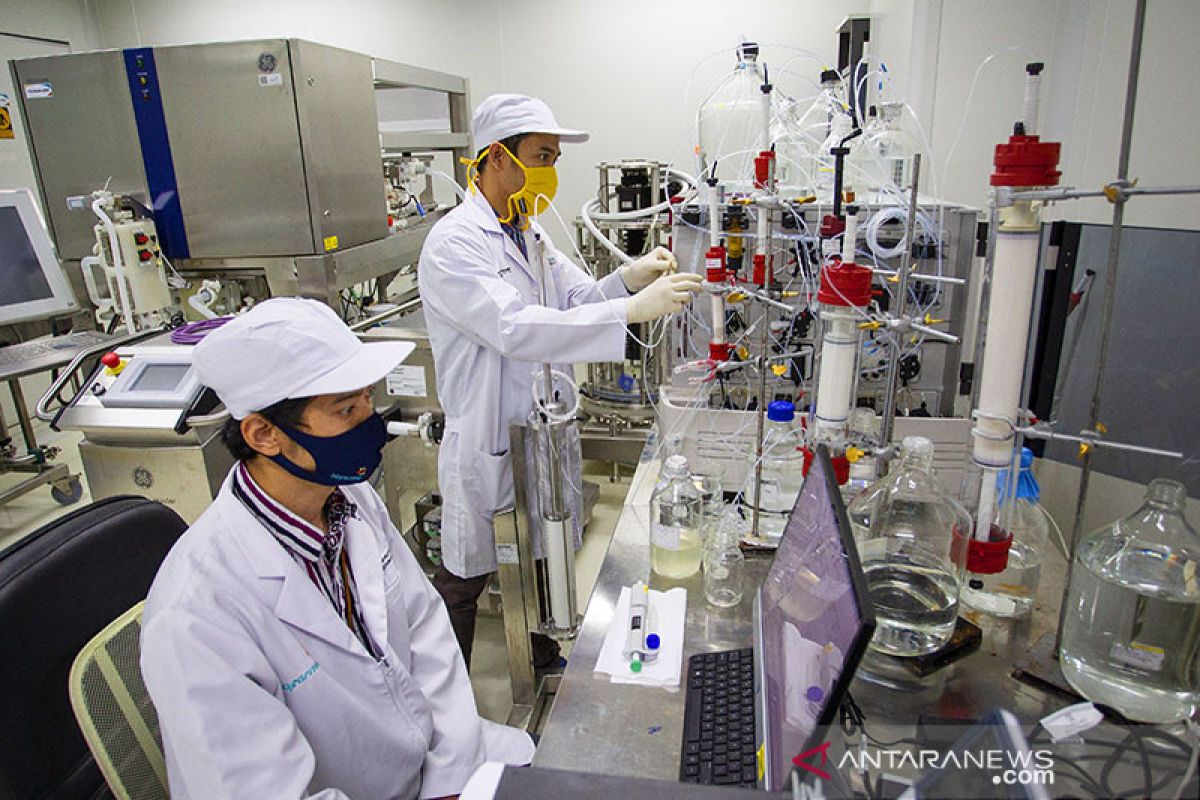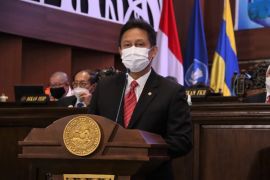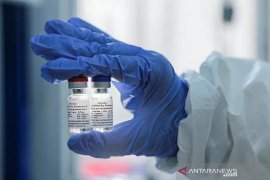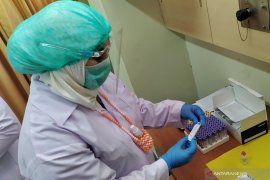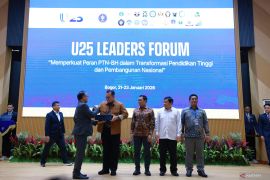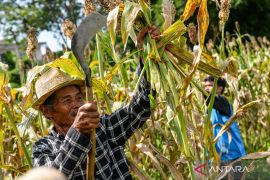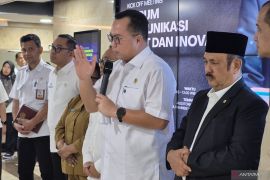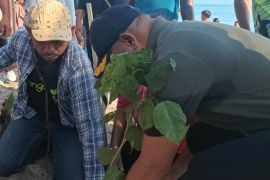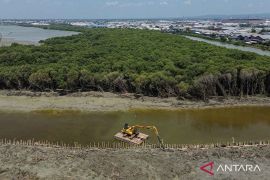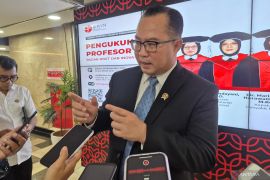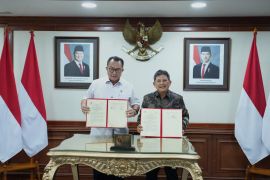In late December 2021, head of the National Agency of Drug and Food Control (BPOM), Penny Lukito, told the press that production of the Red and White vaccine would begin in the second half of 2022.
One vaccine candidate, which is being developed by a team of Surabaya-based Airlangga University in collaboration with PT Biotis, is currently in production for clinical trials, which will commence soon, she informed.
In addition, the production of another vaccine candidate developed by Bio Farma and Baylor College Medicine is also targeted to start in the second half of 2022, she added.
The Indonesian government launched a nationwide vaccination program on January 13, 2021, in a bid to boost immunity against COVID-19. The vaccination program is mainly using CoronaVac bought from China’s Sinovac pharmaceutical company.
Other COVID-19 vaccines being used for the program include AstraZeneca, Pfizer, and Moderna, which have been partly donated by countries such as the US, Japan, and the UK, and received through the COVAX Facility.
The government announced efforts to develop the indigenous vaccine, named after the national flag Merah Putih (Red and White), in August 2020.
“For the past three months, we have been developing our own vaccine, specifically from the COVID-19 virus strain that has been spreading in Indonesia,” President Joko Widodo (Jokowi) had said in Bandung, West Java, on August 11, 2020.
Earlier, the animal trials for the Red and White vaccine were expected to be completed in 2020 and the vaccine was projected to be fully ready in mid-2021.
The indigenous vaccine's development, however, has been behind schedule.
Developing the Red and White COVID-19 vaccine is a big challenge as no single country has experience in developing such a vaccine from scratch, according to chief of the National Research and Innovation Agency (BRIN), Laksana Tri Handoko.
"Actually, what is more important is to give opportunities to our researchers to gain experience in developing vaccines," he said on January 16, 2022.
The vaccine development process needs deep and complex research and development, Handoko said. Normally, no single research will automatically produce a potential vaccine candidate, he added.
In general, it takes up to dozens of years to develop a vaccine, he noted. In fact, the development of a vaccine is not automatically fruitful as expected, according to the BRIN chief.
Although researchers are required to accelerate the development of COVID-19 vaccines during the pandemic, the vaccines must pass through all processes, in accordance with the required standards, in order to secure emergency-use authorization from the Drug and Food Control Agency (BPOM), Handoko explained.
The Red and White vaccine could be utilized for both booster shots and regular COVID-19 vaccinations, he said.
The development of the vaccine can be considered as a form of knowledge investment for allowing Indonesia to produce a variety of vaccines to meet demand in the future, he added.
Hence, the Indonesian government has continued to support and facilitate the accelerated development of the indigenous COVID-19 vaccine, he said.
In fact, the focus of BRIN's research in 2022 will be COVID-19 handling, especially the Red and White vaccine and the development of non-Polymerase Chain Reaction (PCR) detection tools, Handoko informed.
So far, the fundamental problems in research in Indonesia have been limited human resources, inadequate infrastructure, and limited funding, he noted.
With the integration of all research institutions in Indonesia, the number of superior human resources will automatically increase, infrastructure will be completed, and funding will also increase, he said.
Seven teams are currently developing vaccine candidates as part of a national consortium for the development of the Red and White vaccine, he added.
The seven teams in the national consortium comprise Airlangga University, the University of Indonesia (UI), Bandung Institute of Technology (ITB), Gadjah Mada University (UGM), Padjadjaran University, the former Indonesian Institute of Sciences (LIPI), and Eijkman Institute for Molecular Biology (PRBME).
According to acting head of the Life Sciences Research Organization of BRIN, Iman Hidayat, the fastest progress in vaccine development has been made by Airlangga University.
"Currently, the team whose progress has been the fastest is the team from Unair, (which is developing the vaccine) in collaboration with PT Biotis, which has completed preclinical trials (for the vaccine) on macaques (monkeys)," he informed.
"Each team is developing the Red and White vaccine using different methods, ranging from vaccines based on virus inactivation (techniques) to vaccines based on recombinant proteins," Hidayat said.
After completing preclinical trials on macaques, Unair and PT Biotis will conduct phases 1, 2, and 3 of clinical trials, he added.
The clinical trials are expected to be completed and emergency-use authorization (EUA) is expected to be obtained from the Food and Drug Control Agency (BPOM) by July or August 2022, he said.
Besides Airlangga University, the team from Eijkman Institute for Molecular Biology that is collaborating with PT Bio Farma has also made quick progress, he noted.
Eijkman is developing a vaccine seed platform based on the recombinant protein sub-unit, while Unair is developing a vaccine seed based on the inactivated virus, he informed.
Meanwhile, other teams are still at the stage of optimizing antigen yield and some are conducting preclinical tests.
According to a researcher from PRBME, Tedjo Sasmono, the Red and White vaccine seed being developed by Eijkman meets the industry's standard.
"According to the industry, the vaccine seed already fulfills the industry standard where the yield matches the industry's demand. It is also immunogenic," he noted.
PRBME is developing the vaccine seed using a recombinant protein platform that utilizes yeast and mammalian cells, he said. Both the yeast and mammalian cell platforms meet the industry's requirements, he added.
PRBME is routinely conducting consultations, discussions, and figuring out the best purification method for vaccine development with PT Bio Farma so that the vaccine can immediately be downstreamed, he said.
In the meantime, Coordinating Minister for Human Development and Culture (PMK), Muhadjir Effendy, has urged relevant authorities to expedite production of the Merah Putih vaccine so that domestically-manufactured COVID-19 vaccine products can be used soon.
"We are optimistic that this production would be accelerated without compromising on the quality, precision, and accuracy of the products," he remarked.
Editor: Rahmad Nasution
Copyright © ANTARA 2022
